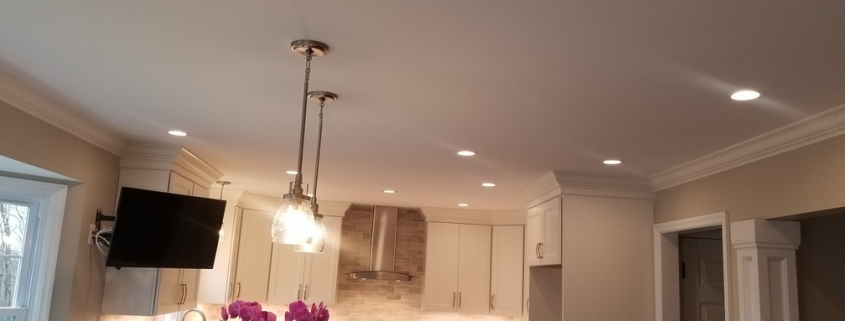Light has a powerful influence over the way your home feels to you and how others perceive your space when they come to visit. It can affect how you use different areas, too. If you’re looking for a quick and relatively inexpensive way to give your home an attitude overhaul, consider relighting the place. You’ve got tons of fixture options available to help you create the exact look you’re going for without having to close rooms off to let the paint dry or the tile set.
So, how will you light up your life?
The First Order of Business: Choose a Theme
There’s nothing more jarring to a visitor or potential buyer (when you’re ready to sell down the road) than to be constantly confronted by spaces that are incongruent. When your living room has an island paradise theme, as implied in part by your banana-leaf ceiling fan, and your kitchen is all retro diner, with sleek stainless steel track lighting, it’s a huge shock to the system.
Before you buy anything lighting-related, have a plan. Decide what color your fixtures will be, and, really, what the overall look of your home will be as you slowly make it your own, and stick to it. That’s not to say that you can’t tweak things here and there, but if you don’t have a plan on a big project like this, you’ll just end up with a mess. You can play it safe and select standard fixtures, all in polished nickel, or you can be bold and choose fixtures that may fall out of fashion, like shiny brass Sputnik chandeliers. As long as you’re consistent, it’ll be ok in the end.
There’s one exception to this rule. Bedrooms are not generally considered to be public spaces in the home, and thus most people don’t subconsciously expect them to adhere to the overarching design theme. If Bobby wants a ceiling fan in his room that has airplanes on it, go for it. You can always replace it before you resell your home.
The Light Layering Two-Step
In most modern homes, you walk into a room and you’re greeted by one weak light coming from the center of the ceiling. This infirm little bulb is trying very hard to pull the weight of several light fixtures and lamps that should be in the room, but it just can’t cut the mustard.
Since homes are generally shown during the day, with the benefit of natural light, both home builders and remodelers often give little thought to the lighting in a house they have for sale. Often homeowners are guilty of this, too.
As a result, when you move in, you may suddenly find that your airy, bright space is actually a dark, cave-like alley where you could as easily be mugged as find a safe place to sleep. This isn’t good, you need more light! Part of the problem is that the one sluggish fixture needs a team to back it up. One light bulb simply isn’t enough, that’s why most interior design experts recommend light layering.
There are three main components to light layering. Your space may not need them all, so feel free to toss out what doesn’t work. They are:
Ambient lighting. This sort of lighting is what that tiny light in the center of the room is trying to be. Ideally, ambient lighting provides a comfortable level of brightness for the entire room. At minimum, you’ll want a multi-bulb central fixture, be that a chandelier or ceiling fan, but some people also incorporate recessed lighting or track lights as well.
Task lighting. You’ll see a lot of task lighting in well-lit kitchens and other work spaces. That under cabinet lighting you were admiring at the home improvement store is a good example of task lighting. It can be any sort of light that’s placed in such a way to make performing a task easier. Just make sure that when you place said task lighting, it doesn’t increase the shadow or create glare.
Accent lighting. Does your house have some really cool stuff in it? Well, this is where you can use lighting to really point it out. You can use accent lighting to highlight artwork, draw the eye to interesting architectural features or simply influence where visitors look around the room. To be most effective, accent lighting should shine three times brighter on the focal point than the general room light.
Small Changes, But High Praise
Simply making small lighting changes can completely change the way your Home AND or Business looks, from top to bottom. Your paint may even be a slightly different shade when it’s all said and done! So many homeowners don’t take advantage of this one simple investment that can give their home such a big boost.









